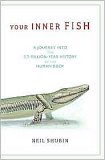


The thesis is intriguing and although not entirely new, it is made fresh and accessible by Shubin's laidback, rather chatty style, not to mention his admirable sense of the ridiculous and his catalogue of dotty anecdotes: an Arctic fossil dig turned to panic at the sight of approaching polar bears that, on closer inspection, were revealed to be large Arctic rabbits, and the marooning of his team on a remote Canadian river bank where they promptly found, by fluke, the fossil of a tritheledont, an extraordinarily rare, 200-million-year-old 'part mammal, part reptile'.

'Our hands resemble fossil fins, our heads are organised like those of long-extinct jawless fish and major parts of our genomes still look and function like those of worms and bacteria.' We are all shark siblings, in short. You can see these biological stigmata today, says Shubin. In this way, a new species is eventually created, albeit one that still carries the hallmarks of its evolutionary predecessors, an inner connection that can - and often does - stretch over the aeons, from fish to humans. As Shubin makes clear, evolution does not proceed in mighty anatomical jumps but through a process of gradual change, by transforming - very slightly - a gene, cell or bone so that it acts to a new purpose. Nevertheless, it is based on sound science. We are all sharks under the skin, he says or, to put it more precisely: 'We're all modified sharks - or worse, there is a lawyer inside each of us.' Yet fossil expert Neil Shubin will have no lampooning of the legal trade. Lawyers scarcely deserve a reputation for being lovable or cuddly. Thus, barristers are equated with savage, underwater killers and distanced, albeit jokingly, from humanity.Īnd why not? you might ask. Take this golden offering: why do sharks not eat lawyers? Professional courtesy, of course. There has never been a shortage of jokes about the moral inadequacies of the legal profession.


 0 kommentar(er)
0 kommentar(er)
